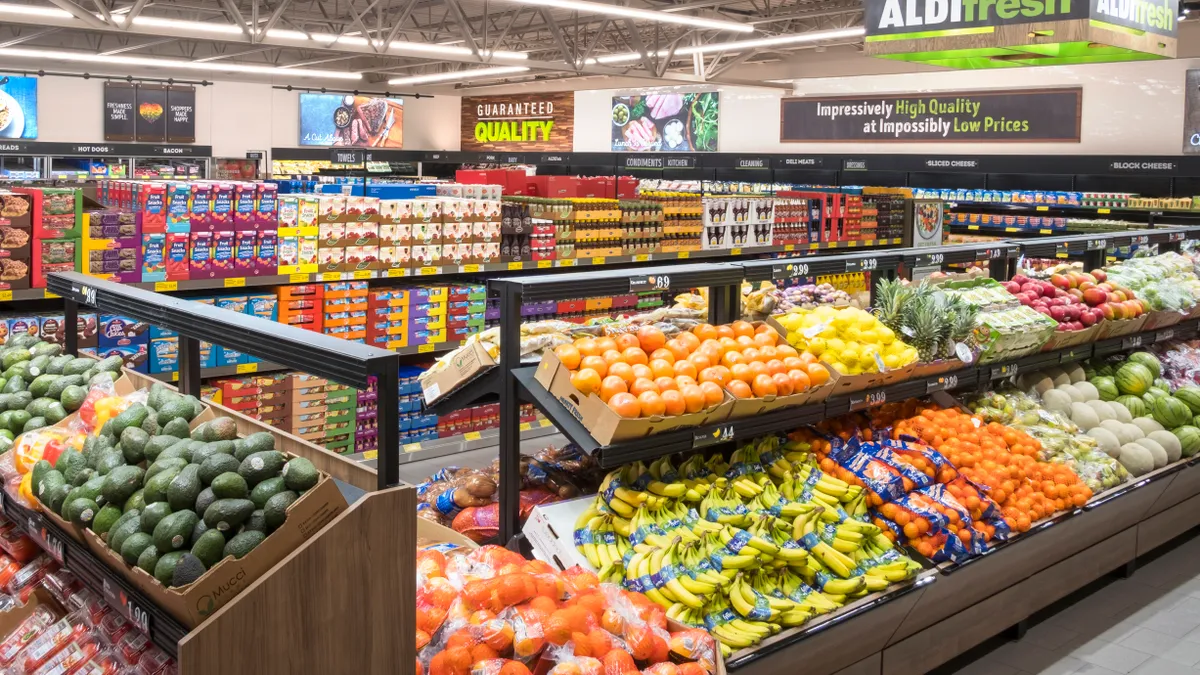Dive Brief:
- Aldi will build at least nine stores in the Phoenix metropolitan area, according to public records obtained by the Arizona Republic. This includes locations in Tempe, Gilbert, Goodyear and Buckeye. The company has not confirmed its Arizona expansion plans, and it’s unclear at this point when the locations will open.
- Aldi also plans to open a regional office and distribution center in Goodyear by 2020.
- The discounter is in the midst of a $5 billion growth plan that kicked off last year. It includes building 2,500 additional stores and renovating 1,300 other locations.
Dive Insight:
Arizona is well known as a popular destination for retirees, but Phoenix has become a hotbed of millennials in recent years. According to real estate firm Jones Lang LaSalle, the city’s vibrant university corridor, a wellspring of tech jobs and an uptick in high-density housing has made it a haven for young, affluent consumers.
“Recently, Downtown Phoenix has emerged as the next hot tech submarket, boasting hundreds of recently developed multifamily units, creative adaptive re-use projects, ample amenities and amazing access to public transportation,” the firm noted in a recent report.
It's no surprise that Aldi, which appeals to a variety of consumers but in particular millennials, would set its sights on Phoenix. The private-label focused grocer, whose stores average 16,400 square feet, probably also likes the competitive environment. Fry’s Food and Drug, a conventional retail chain owned by Kroger, is the area’s market share leader, according to Chain Store Guide. And while there are some dollar stores scattered around, Phoenix doesn’t have any other discounters to speak of.
If recent reports are any indications, Aldi could unsettle the sun-soaked city’s grocery players. In Southern California, where it operates more than 50 stores and will build around 25 more this year, Aldi has pushed competitors to lower prices by 3% on average, according to Strategic Resources Group. Florida, another state that’s seeing an influx of grocery competition, is also feeling the impact of Aldi’s super-low prices.
After decades of quietly building its mini-warehouse style stores across the U.S., Aldi now sees an opportunity to upgrade its approach and capitalize on the growing demand for private labels, low prices and a smaller, more curated shopping experience. In regions across the country, it’s livening up its stores and putting in more fresh offerings — part of an effort to reach more affluent consumers that shop conventional grocery stores and even specialty retailers such as Whole Foods.
“What I find really interesting is that despite these improvements to the look and feel of the store, they’ve stayed very true to the hard discount model in terms of efficiency,” Stewart Samuel, program director with IGD Canada, told Food Dive last year.
Other chains have struggled in the Arizona market, including Tesco’s Fresh & Easy along with Bashas’. Aldi is a much stronger operator than those two companies, though it may still find the environment challenging. Phoenix is the hometown of Sprouts Farmers Market, which has its own low-price approach to fresh that’s resonating with consumers nationwide. It also will square off against Trader Joe’s, which has several locations around the city and tends to draw from a wide radius. There’s also Walmart, Aldi’s main nemesis in grocery.
It’s also unclear how e-commerce might impact the market as it expands. Aldi offers home delivery in a few markets, including Chicago and Atlanta, but its focus remains squarely on drawing shoppers to its stores. As Walmart and Amazon/Whole Foods keep expanding home delivery across the U.S., they could put pressure on Aldi.
While discount counterpart Lidl has struggled to gain a foothold in the U.S., Aldi has fine-tuned its approach and is poised to become a leading national chain. With its low prices and habit-forming store brand products, it’s also creating a lot of pain for traditional retailers.









